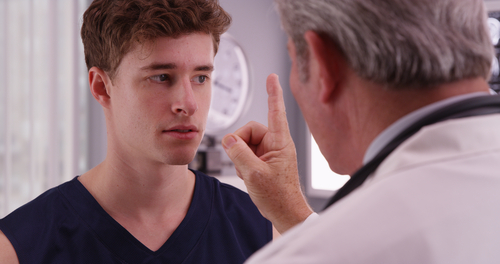
Many people don’t realize that concussions can result from direct impact to the head or sudden acceleration/deceleration of the head, like in whiplash. Loss of consciousness is not always a symptom, despite being a commonly associated symptom. Therefore, it’s important to be aware of any signs that could signal a concussion.
Oftentimes, first responders will look into a person’s eyes after sustaining an injury as part of their neurological assessment. If you’re asking why, read on to find out what role the pupil check plays in this process.
The Link Between the Brain and the Eye
Trauma to the brain, either directly or indirectly inflicted, can cause a concussion. Around half of the brain circuits are related to eyesight, eye movements, and overall vision. For this reason, concussions often result in visual symptoms.
Eye doctors can be useful in assessing a recent concussion. They can do so through fast automated naming tests and eye movement tests. Specifically, convergence, eye-tracking, and a vestibular-ocular motor screening tool may be implemented for this purpose.
A neurological assessment after head trauma is incomplete without examining the patient’s pupils. This evaluation helps immensely in understanding the severity of the injury, thereby influencing treatment decisions.
What Are the Common Visual Symptoms?
An estimated 90% of individuals who suffer from concussion experience eye symptoms. These include dilated pupils, drooping eyelids, and difficulty following objects. Oftentimes, these symptoms can be difficult to recognize. In some cases, people with a concussion may also experience blurry vision and difficulty staying focused. They may also show heightened sensitivity to bright lights or problems with depth perception. Others exhibit difficulty recalling past events.
Usually, signs and symptoms of an injury become noticeable right away. However, you may not be aware of the severity of the injury initially, and certain symptoms could take some time to appear. At first, when a person experiences a trauma, they might be somewhat disoriented and not recall what happened afterward. But after some time, the memory of what occurred will return, though maybe distant and fuzzy at first.
When to Call the Doctor
The majority of individuals who experience concussions will heal quickly and completely. However, some people may take longer to recover, with symptoms lingering for up to several weeks. It’s critical to seek immediate medical attention if the symptoms have gotten worse at any time. The same goes for when the symptoms don’t seem to go away after 10 to 14 days. It’s important to call a doctor if exhibiting any symptoms such as seizures, slurred speech, lost consciousness, or difficulty waking up. Other signs to watch out for are recurring headaches, decreased coordination, numbness, weakness, repeated vomiting, or a history of multiple concussions.
Are you experiencing vision changes or symptoms? Schedule your eye exam today with our eye health professionals at Eversee Boutique Eyecare. Call our clinic now in Winnetka, Illinois, at (847) 386-9045 for an expert diagnosis.






